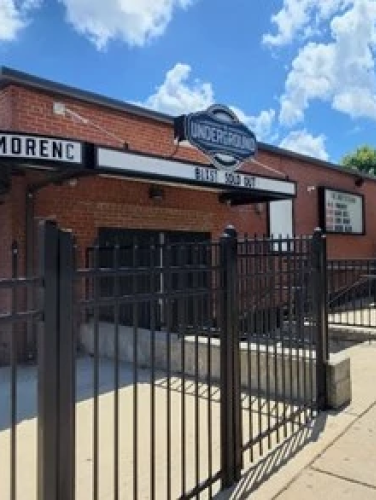
John B. Ross and Company Mill
(ca. 1904 - 1950s)
A longtime mill for asbestos textile products, the John B. Ross and Company Mill was reinvented in the 21st century as a music entertainment destination.
820 Hamilton St. and 900, 950 and 1000 NC Music Factory Blvd., Charlotte, NC 28206
The John B. Ross and Company Mill, which first produced cotton bags and ties, was built in stages from 1904 through the 1950s with minor additions in the 1960s. For most of its history, however, the facility was occupied by the Southern Asbestos Manufacturing Company, a major supplier of fireproof cloth products that used the mill to produce asbestos textile products. Between 1880 – when the first successful textile mill (the Charlotte Cotton Mills) was established in Charlotte – and 1902, some 300 mills were constructed and in operation within 100 miles of Charlotte. Between 1900 and 1910, the number of industrial plants within the city nearly doubled, from fifty-seven to 108. Many of those industrial buildings, like the John B. Ross and Company Mill, were constructed in uptown Charlotte.
Property Quick Links
In 1904, local manufacturer, developer, and businessman John B. Ross constructed the first John B. Ross & Company building on the site as a textile mill. As one of the property’s two surviving structures, that building came to be known as Mill #1 for the Southern Asbestos Company Mills complex. Other buildings on the site in 1904 included a small brick office building, two storage sheds, and a freestanding water tower. Additional buildings were added in 1911 as production expanded, including a tile-making building. The Southern Asbestos Manufacturing Company moved into the complex in 1920 and began manufacturing a complete line of asbestos yarns and textiles. With the exception of Mill #1, the other Ross-constructed buildings were demolished to make way for new buildings more conducive to Southern Asbestos’ manufacturing needs, including a second mill building (Mill #2) and a small bridge section providing internal access between the two mills. Southern Asbestos Manufacturing (by then known as Southern Asbestos Company) purchased the property from the defunct John B. Ross and Company in 1924. From 1920 to 1957, the mill – then known as the Southern Asbestos Company Mills – was the largest producer of asbestos textiles, yarn, thread, and cord in Mecklenburg County. It provided an important source of employment, income, and industry for Charlotte and the surrounding area for several decades. In April 1929, the Thermoid Company of Trenton, New Jersey – one of the largest U.S. manufacturers of brake linings for automobiles and industrial machinery – purchased a controlling interest in the Southern Asbestos Company. Thermoid used the company to fulfill its asbestos yarn and cloth needs for the manufacture of its brake linings and other products.
During the 1940s and early 1950s, the new owner retained prominent mill architect R. C. Biberstein (1859-1931) to update and expand the two mill buildings. The 1960s saw more additions and buildings, as well as a new corporate structure. Southern Asbestos Company became Southern Textile Corporation and was then acquired by H.K. Porter and Company. In 1983, the property was sold to another asbestos textile manufacturer, Southern Manufacturing Company, launching a series of transactions in which the property changed hands several times. Acquired in 2001 by local developer Fiber Mills, LLC, the property was named a Brownfields Project by the State of North Carolina due to the environmental contamination caused by the site’s longtime asbestos production, prompting extensive decontamination and mitigation efforts before the new owner began adaptive reuse projects for the former mill, including the transformative North Carolina Music Factory.

